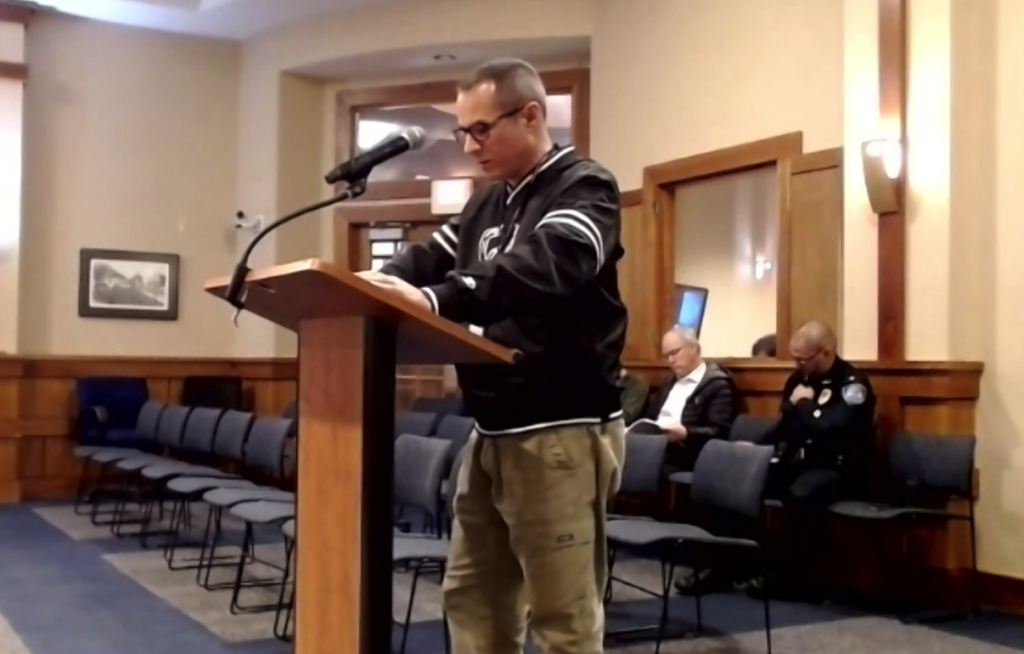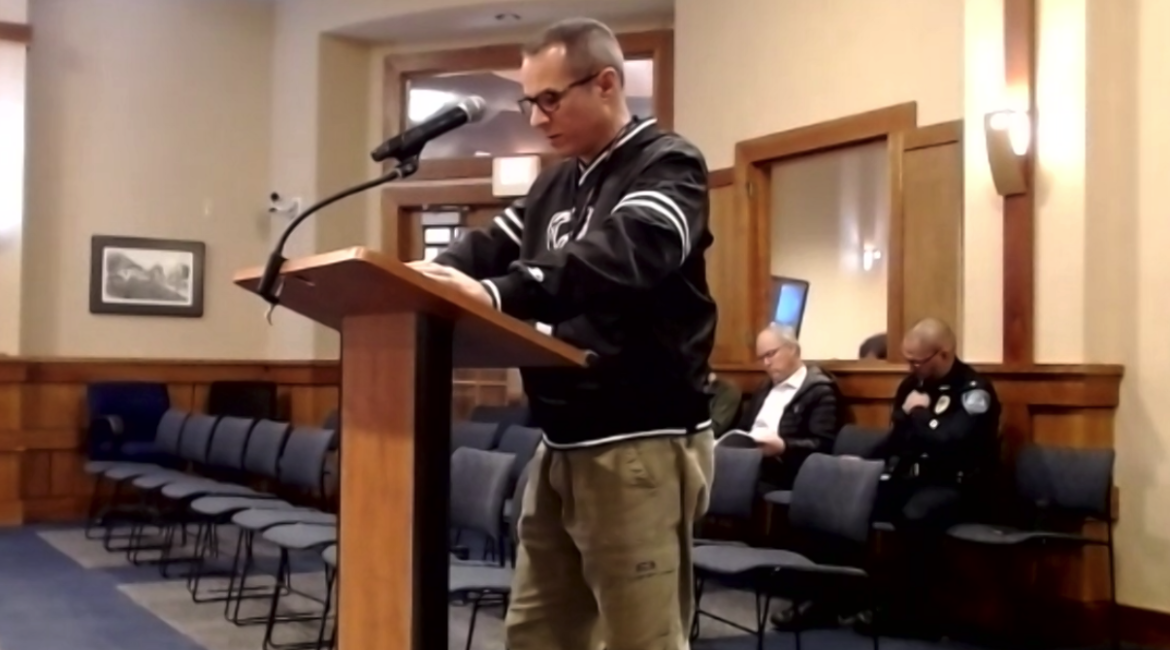By Kim McDarison
Two ordinance amendments brought before the Whitewater Common Council Tuesday — one increasing the number of class A liquor licenses made available by the city and a second limiting proximity of food trucks to brick-and-motor food establishments — garnered first-reading approval.
Both were approved by unanimous vote. Councilman Greg Majkrzak was not in attendance.
Increase in liquor licenses
Council approved increasing the number of class A liquor licenses available that could be awarded by the city to businesses looking to sell in-package products.
According to the agenda, the amendment, which will return to council for a second reading, seeks to raise the city’s quota for class A beer and liquor licenses from four to 12.
As stipulated within the ordinance, the city holds a quota for class B liquor licenses of 24.
City Attorney Wally McDonell, addressing council remotely and on behalf of City Clerk Michele Smith, who was not in attendance, said that the ordinance amendment to increase the class A license quota had come before council after the city had earlier increased its quota by two class A licenses at the request of Kwik Trip.
McDonell shared definitions of the two types of licenses — class A and class B — noting that class A was not the type of license that was typically associated with bars and taverns.
Describing class A licenses, he said: “that’s where you can buy liquor and beer in stores, and the classic ones would be at Casey’s … and Walmart … and obviously other stores as well.”
McDonell noted that after the city granted two class A licenses to Kwik Trip, other business owners had come forward, looking to obtain similar licensure.
He said: “Michele (Smith) and the city have received some additional requests (from) business owners seeking to receive those types of licenses, and I know there’s been some indication that they felt it was fair and justified because the quota was increased for Kwik Trip — that there should be an increase for other businesses that would like to sell … That is why it was put on (the agenda), to give the council an opportunity to increase the number.”
Additionally, McDonell said, would the council approve the increase in the quota, it would be “very much in line with other communities; the number of those types of alcohol licenses and their in-package-type … is not like a tavern. It’s a bottle of liquor, six-pack of beer or 12-pack of beer, that type of thing.”
He continued: “Of course the licensing, just because they’re available, doesn’t mean it’s a rubber stamp; that they are handed out without being fully vetted. First of all, the police department would be involved in the application processes as well as the other city staff, and ultimately, the council will have to approve any license. So this just allows more licenses to be granted by increasing the quota.”
The motion was approved without additional discussion.
Food Trucks
Describing the proposed amendment to the city’s transient merchants ordinance as “tidying up some language as it pertains to food trucks,” Neighborhood Services Director Chris Bennett said the intent of the amendment was to add language stating that food trucks cannot conduct business within 100 feet of a licensed food establishment unless the truck operator has written permission from the owners of the establishments within that vicinity.
Additionally, he said, the language was meant to ensure that trucks were added to the section of the ordinance concerning food sales. As written, before approval of the amended language, the ordinance identified carts, but not trucks.
A final change was developed to ensure that food truck operators provided proof of liability insurance to the city clerk before they could operate in the city, he said.
After the presentation, Councilwoman Jill Gerber asked about restrictions pertaining to noise that might emanate from generators used by food trucks.
She noted that within the ordinance, trucks would be allowed to operate until 3 a.m. She expressed concern that the early morning time frame might be inappropriate with regard to potential noise from generators.
Bennett said the time was already part of the ordinance, adding that the intent of the amendment was not a “full rewrite.
“We are just tweaking a couple of things here and there, so there’s a lot of stuff we didn’t touch,” he said.
He agreed with Gerber that a generator “sometimes seems loud.”
He asked Gerber for any suggestions she might make to offer a different time.
City Manager John Weidl said staff could consider the suggestion and make suggestions of its own, noting: “One thing off the top of my head is maybe there’s a distance from residential neighborhoods, if they are going to operate that way. Maybe we can use a cutoff. They can only stay open to 3 a.m. if they are largely in the downtown, or an area that’s not … I don’t know, we’ve got to think about it.”
Gerber suggested “cutting the time down.”
Councilman Jim Allen said he had only noticed food trucks operating during early morning hours in the downtown area.
Council President Lisa Dawsey Smith said that the ordinance specified that food trucks could only operate in the city’s B2 District.
“So the portions of it that are being changed are specific to downtown. That would probably need to be a larger conversation if you wanted it here because food trucks are not currently allowed outside of downtown, at all,” she said.
Councilwoman Brienne Brown pointed to language within the ordinance stipulating that food trucks could not begin operation before 9 a.m.
She wondered why the time was chosen, noting that food trucks that serve breakfast could benefit from an earlier starting time. She suggested 7 a.m.
“It’s a weird time thing,” she said, adding: “I’m ok with approving it (the amendment) with the additional stuff on it. I think we need to bring this back.”
Weidl said the amendment was appearing before council for its first reading. The language could be returned at a later date as a second first reading or as a second reading.
“There’s no rush,” he said.
Dawsey Smith said she was interested in seeing changes made to the ordinance that would increase the food truck vender license application fee, which, according to the ordinance, is $2.
She also said she would be interested in making changes to the vetting process required for licensure within the ordinance, which stipulates that the applicant produce two references from Walworth County property owners. She suggested the language should be changed to include something similar to a background check.
Would a background check become a requirement, she said, then she was in favor of the increase in application fee to be more representative of the time it would take for staff to undertake that process.
Further, Dawsey Smith said, within the ordinance, food sales are limited to certain locations, among them is the area along First Street between Main and North streets.
“That’s not a level street. So if we are putting food trucks out there, they’d be serving at an angle,” she said, calling the offerings “ literally sliders.”
Weidl said council members’ concerns could be addressed.
“It was just sort of a first shot over the bow,” he said of the amendment, adding that the initial intent was to offer the ordinance more structure and address issues of liability, and to ensure that food truck vendors had liability insurance.
“This item was on the punch list for a lot of us (staff) to get done by the end of the year. And so we decided to throw it on the wall and get you (council) to help us make it stick,” Bennett said.
Brown said she would like to revisit a section of the ordinance addressing noise from speakers. She suggested that the ordinance might serve as a deterrent for those venders operating ice cream trucks.
“It says no bells, no amplifying devices, so with an ice cream truck … it just seems like it cuts short entrepreneurial activity,” she said.
Said McDonell: “Our transient merchant ordinance does currently regulate door-to-door sales quite strictly. Since we are bringing it back, maybe there’s going to have to be a change in how that’s regulated.”
He said he wanted to supply a “heads-up” so there would be no surprises if that part of the ordinance also appeared before council with the amendment’s next reading.

City of Whitewater Neighborhood Services Director Chris Bennett Tuesday presents Whitewater Common Council members with an amendment to an ordinance governing food truck regulations. Photo/Video screen shot.
This post has already been read 1220 times!
